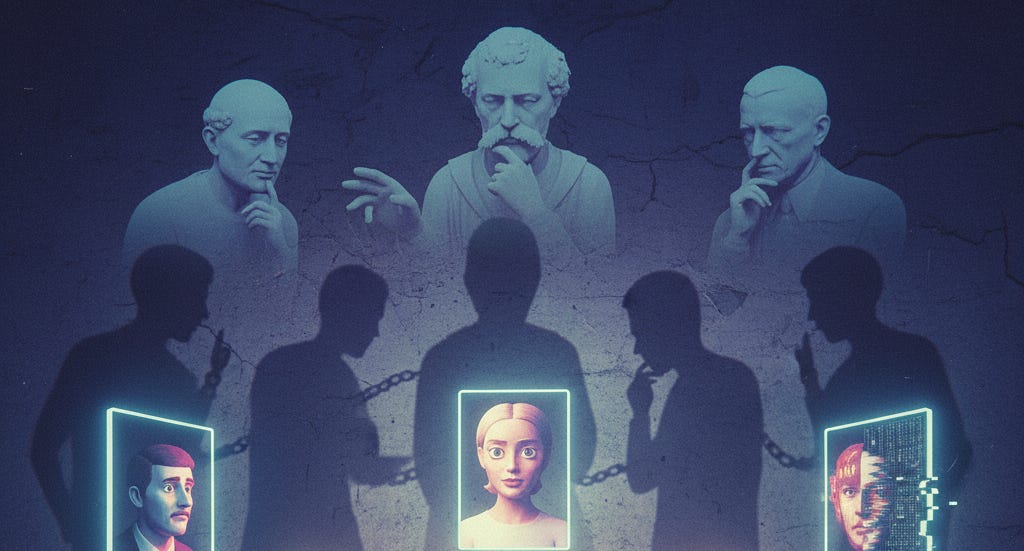Shadows on the Feed | A Philosophical Inquiry into Social Media, Identity, and Truth
Exploring how digital platforms reshape the self and blur our sense of reality.
“Who am I?” and “What is true?” these two questions have haunted philosophy since its birth in ancient Greece. Today, they return with urgent force in the age of social media.
Every day, billions of us log in to platforms like Instagram, TikTok, X, and Facebook. We create profiles, curate images, share stories, debate politics, and consume endless information. Yet what seems like ordinary activity hides deeper philosophical implications. How does social media shape our sense of identity? What does it do to truth? And how should we live, knowing our lives are filtered through algorithms?
Plato, Nietzsche, Kierkegaard, Foucault, and other thinkers did not know about TikTok or Instagram. But their insights remain startlingly relevant. In fact, social media has become the new “allegory of the cave,” the new “mask,” and the new “panopticon.”
This essay explores the impact of social media on identity and truth through a philosophical lens. We will ask -
What is the nature of the “self” in a world of profiles and feeds?
Can truth survive in an algorithm-driven information economy?
And how might ancient wisdom help us navigate the digital present?
Meditation I | The Self in the Age of the Profile
1. Identity as Performance
The sociologist Erving Goffman once described everyday life as a stage where each of us performs roles depending on context. Philosophically, this echoes Nietzsche’s observation that human beings wear masks sometimes knowingly, often unconsciously.
On social media, this metaphor becomes literal. Our Instagram feed is a stage, our tweets are lines in a script, and our stories are spotlights. We curate, edit, filter. The self becomes performance.
Here we face Kierkegaard’s warning | when we define ourselves through “the crowd,” we risk losing authenticity. Am I really myself, or merely the version of myself that earns likes and approval?
Philosophical Question: If identity is performed, is there still a “true self” behind the performance or is the performance all there is?
2. The Fragmented Self
Before the internet, identity was already multi-layered we were parents, workers, citizens, friends. But social media fractures the self even further. On LinkedIn, I am professional. On TikTok, playful. On Twitter, political. On Instagram, aesthetic.
Paul Ricoeur distinguished between idem identity (sameness over time) and ipse identity (the story we tell about ourselves). Online, our narrative self becomes fragmented into competing micro-identities.
This fragmentation risks what Nietzsche called ressentiment a life driven by comparison and insecurity. The “true self” becomes difficult to hold onto when scattered across platforms.
Philosophical Parallel: Just as Plato’s prisoners mistook shadows for reality, we may come to mistake our digital fragments for the whole of who we are.
Meditation II | Truth in the Age of the Algorithm
3. The Erosion of Shared Reality
In the Republic, Plato described prisoners in a cave who mistake shadows for truth. Today, our caves are newsfeed. Algorithms do not show us reality they show us what will keep us scrolling.
The philosophical consequence is profound | We no longer inhabit a shared reality. Each feed creates a personalized cave. My truth is what the algorithm serves me your truth is different. The idea of common truth begins to collapse.
Nietzsche’s declaration that “there are no facts, only interpretations” feels chillingly prophetic. What he intended as a radical challenge has become a business model.
4. The Rise of Post-Truth
In 2016, Oxford Dictionaries named “post-truth” the word of the year. This describes a world where emotions outweigh facts in shaping beliefs. Social media fuels this by rewarding what provokes outrage, amusement, or fear not what is accurate.
Here we return to the ancient Sophists, who prized persuasion over truth. Plato fought them by insisting that truth must be pursued beyond appearances. We are once again caught in this ancient struggle philosophers versus Sophists, truth versus persuasion.
Philosophical Question: If truth becomes irrelevant to attention, can truth still matter in public life or does it dissolve into performance?
Meditation III | Social Media, Power, and Control
5. Who Owns the Narrative?
Michel Foucault taught that truth is always tied to power. What counts as “true” depends on who controls discourse. In the digital age, the gatekeepers are not governments alone, but corporations like Meta, Google, and X.
What trends, what disappears, what gets flagged all of it is shaped by hidden structures of power. The “truth” we encounter online is curated by forces we rarely see.
This raises the ethical question | Are we free thinkers, or participants in a grand attention economy where our beliefs are engineered?
6. The Digital Panopticon
Foucault’s concept of the “panopticon” a prison where inmates never know when they are being watched captures social media perfectly. Every post could be judged, every word screenshot, every mistake amplified.
We begin to censor ourselves, internalizing the gaze of others. Authenticity becomes almost impossible when we live as though always under surveillance.
Philosophical Parallel: This recalls Jean-Paul Sartre’s concept of “the Look.” To be looked at by another transforms us into objects. Online, we live permanently under the Look watched not just by individuals, but by masses and machines.
Meditation IV | Reimagining Identity and Truth
7. Can There Be Authenticity Online?
Kierkegaard insisted that true existence requires becoming oneself in the face of external pressures. In the digital age, authenticity may not mean abandoning platforms but resisting their pull toward conformity.
Ways to practice digital authenticity
Post with intention, not compulsion.
Distinguish between performance and genuine expression.
Resist constant comparison, which Kierkegaard saw as spiritually corrosive.
Authenticity today requires vigilance. It means refusing to let algorithms dictate our sense of self.
8. Reclaiming Truth
Philosophy reminds us that truth must be sought, not consumed passively. To reclaim truth online, we must become digital skeptics question sources, test claims, and resist emotional manipulation.
This is a call to revive the Socratic method in the digital agora. Instead of accepting what trends, we must ask |Is it so? Who says? On what grounds?
In a world of manipulated images and crafted illusions, truth is not a given but a discipline a practice of constant questioning.
Meditation V | Toward a Digital Philosophy of Life
9. The Double-Edged Sword of Technology
It would be easy to condemn social media as corrupting. Yet philosophy demands nuance. As Heidegger noted, technology both reveals and conceals. The same platforms that spread falsehoods can also amplify marginalized voices, expose injustice, and create solidarity.
The danger lies not in the tool itself, but in our unreflective use of it.
10. A Call for Philosophical Engagement
What would a truly philosophical approach to social media look like? Perhaps something like this:
Socratic: Use platforms to question, not just to broadcast.
Stoic: Focus on what is in your control (your attention, your integrity), not on viral fame.
Existentialist: Embrace responsibility for the selves we project.
Nietzschean: Create bravely, using the medium as a stage for originality rather than conformity.
These are not mutually exclusive. Together, they form a digital philosophy of life an approach to online existence that seeks depth rather than distraction.
In the End
Social media is not just a cultural phenomenon. It is a philosophical challenge to the very concepts of identity and truth. It forces us to ask Who am I when filtered through likes? What is true in a world of curated feeds? What does it mean to live authentically under constant observation?
At its worst, social media fragments the self, distorts truth, and traps us in algorithmic caves. At its best, it can be a stage for creativity, dialogue, and justice.
The task before us is philosophical to live consciously rather than passively, to seek truth rather than shadows, to become ourselves in a world that constantly pressures us to be something else.
As Socrates might say if he were alive today. Do not just scroll examine your life, even online. For the unexamined feed is not worth following.
Does social media reveal who we truly are, or does it shape us into something we are not?
When so much of what we see online is filtered or manipulated, how can we tell the difference between appearance and truth?
If philosophy is the practice of questioning, what would it look like to live philosophically in your own digital life?





'The unexamined feed is not worth following.' That's brilliant. I like that. 😂 So true. That's what I'm trying to do. Question, inquire, and reflect on my own biases and assumptions, and try to understand life from as many angles as possible.
The media is the message 😎